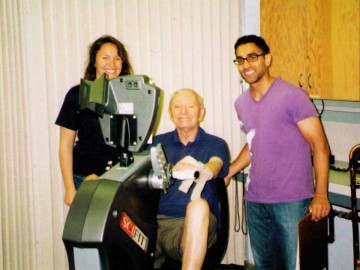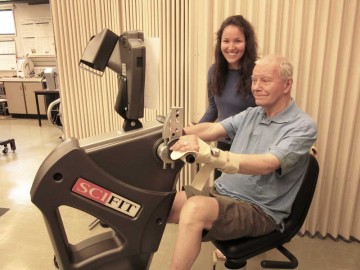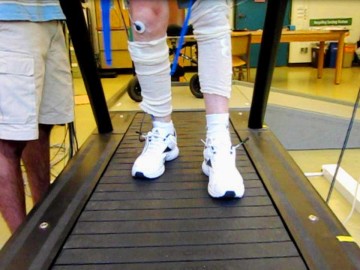In the summer of 2011, Kulveer Parhar, Vancouver Fraser Medical Program Class of 2014, visited Victoria to participate in a SSRP research project supervised by Dr. Paul Zehr.

Left to right: Taryn Klarner, a research patient, and Kulveer Parhar
Please briefly describe SSRP project you were involved in.
KP: I worked along PhD candidate Taryn Klarner on a pilot project investigating the efficacy of an arm and leg cycling rehabilitation intervention on post-stroke locomotion and clinical outcomes. The study involved three male participants with low to moderate post-stroke function. The six week intervention involved participants cycling on an arm and leg ergometer for thirty minutes, three times a week. At five minute intervals throughout the thirty minutes, heart rate, rating of perceived exertion and cadence were recorded. In addition, pre- and post-intervention measurements of stretch reflexes, spasticity, muscle activity, range of motion, and functional walking outcomes were recorded.
What, specifically, about the research topic interested you?
KP: My interests in neuroscience, musculoskeletal dynamics, and rehabilitation in neurotrauma patients attracted me to the research in Dr. Zehr’s lab. My undergraduate education in kinesiology was also applicable to this project. Dr. Zehr and his lab are working on some fascinating projects that have clinical applications and this was definitely an appealing factor.
What did you learn both (a) academically and (b) clinically?

PhD Student, Taryn Klarner with a research patient.
KP: As this was a pilot project, I learned the steps involved in developing an idea into a research project. I also learned about the pathophysiology of stroke and the associated clinical consequences. Furthermore, I expanded my knowledge on current rehabilitation techniques for stroke patients. Also important, I gained exposure to working with stroke patients and learned some of the challenges involved with working with this population group. The skills I gained with prove useful in my future clinical practice.
What do you feel participating in this project will have contributed to your medical education?
KP: I believe gaining exposure to a variety of areas of medicine is an important aspect of one’s medical education. Rehabilitation methods are not well covered within our curriculum so this SSRP provided me with the opportunity to pursue an area of study that I am interested in. Moreover, working on this project showed me the strong interconnect between research and clinical practice. My future as a physician will be based on evidence based medicine and I have a greater appreciation for what that means after working in Dr. Zehr’s lab.
Dr. Paul Zehr is a professor in the University of Victoria’s Division of Medical Sciences. He supervised the project Kulveer participated in.
Please briefly describe the SSRP project you led.
PZ: The project Kulveer participated in under the umbrella “Improving the strength and functional ability in the more affected limb by training the less affected limb after stroke” includes two components: a) a strength training piece where targeted resistance training of the less affected limb is used to strengthen the untrained, more affected limb (with my PhD student Trevor Barss); and, b) a locomotor retraining intervention using arm and leg cycling (involving both more affected and less affected arms and legs) exercise to improve walking ability (with my PhD student Taryn Klarner).

A research patient walks on the treadmill as part of the study.
How were the students involved in the research?
PZ: Kulveer assisted with data collection in stroke participants, helped supervise the thrice-weekly training sessions, and conducted initial data analysis.
How do you think participation in projects like this enhance the educational experience of UBC medical students?
PZ: I think it is very important for MED students to gain direct experience with research work in clinical populations. It gives them a different viewpoint than they might have seeing the same population in clinic. For example, in this project Kulveer got to see participants with stroke achieving improvements in ability through training—he got to see their potential and they were active agents. In a strictly non-research clinical setting that group might be seen as patients with problems that need solving and perceived as more passive agents.
How do you feel you benefit by working with students on research projects?
PZ: I look at this as a bit of pay-it-forward. I think exposing medical trainees to our research environment expands their viewpoints that they can bring to their own clinical practice. This is particularly the case for research in clinical populations. It’s also a benefit for the mixture of trainees in my own laboratory who all come from different backgrounds and have different strengths.